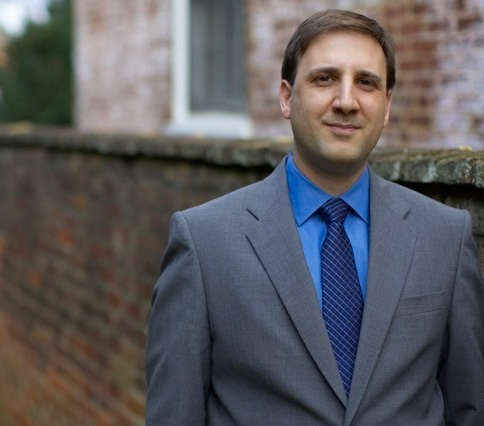James Loeffler, an associate professor of history in the University of Virginia’s College of Arts & Sciences, has received a fellowship to study international law for a book project on the history of human rights.
The Mellon New Directions Fellowships assist faculty members in the humanities – arts, history, languages and area studies – as well as fields such as anthropology and geography that bridge the humanities and social sciences, to acquire systematic training outside their own areas of special interest. The fellowship will cover the equivalent of one academic year’s salary, two summers of additional support and tuition fees and other costs associated with the fellows’ training programs. “This project has already led me far afield from my original training in modern Jewish and European history,” he said. “I now find myself ensconced in the highly specialized world of international law, grappling with a distinctive conceptual framework, disciplinary methodology and technical language, all of which are entirely novel to me.”
Loeffler said the fellowship will allow him to devote two semesters to international legal studies through a non-degree program at the Georgetown University Law School. (He will take sabbatical leave next year.) His book-in-process will be the first systematic examination of how the intertwined experiences of genocidal anti-Semitism and modern Jewish politics inflected 20th-century Jewish conceptions of human rights, Loeffler said.
“The vast majority of the historical research in this burgeoning field has assumed that the Holocaust was the key impetus for the emergence of modern human rights law after World War II,” he said. “Yet surprisingly, scholars have never critically examined the actual role of the Jewish legal thinkers and nongovernmental organizations that pioneered several of the key ideas and institutions at the heart of postwar international human rights law.”
Loeffler was attracted to the topic, in part, because of the Jewish role in the human rights movement.
“Jews have been some of the greatest beneficiaries of human rights in the past, such as the international campaign to free Soviet Jewry, and some of the fiercest critics of human rights in the context of the politicization of human rights law involving Israel and the Palestinians,” he said. “I wanted to explain how these two phenomena could take place at the same time.
“Second, it was a topic that everyone alluded to, but no one actually analyzed. I found that many people offered wildly bizarre theories to explain why so many Jews chose this professional path.”
Loeffler is the author of “The Most Musical Nation: Jews and Culture in the Late Russian Empire,” about Jewish/Russian composers before and after the Russian Revolution. He has also launched the history department’s first course on the history of human rights; it began as a 12-person seminar in fall term of 2010, and is now an annual 120-student lecture course.
Media Contact
Article Information
May 6, 2013
/content/history-professor-receives-fellowship-study-international-law

